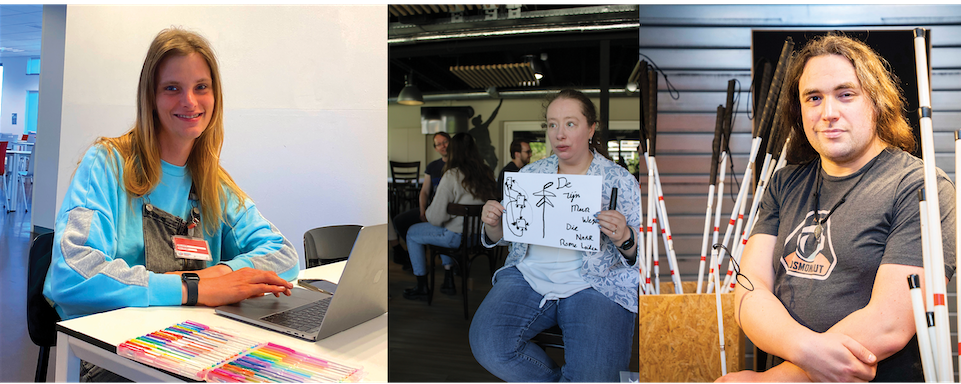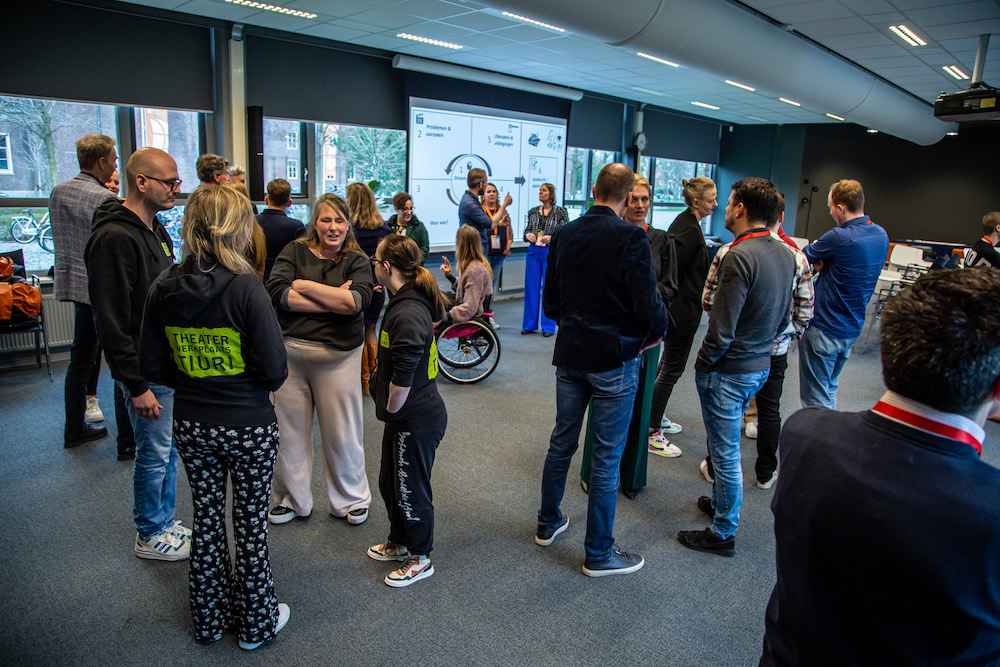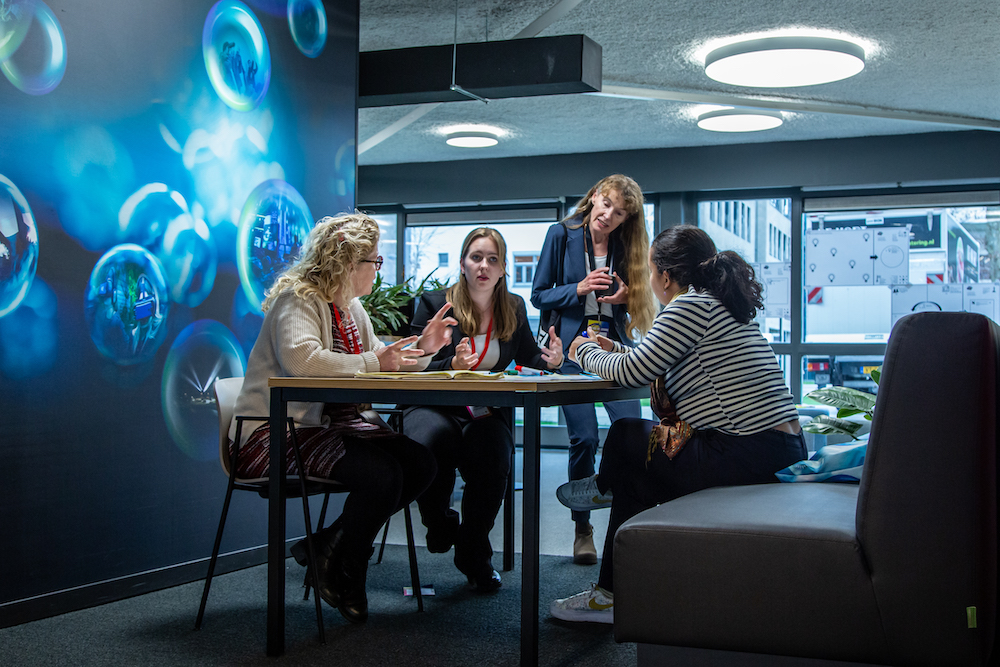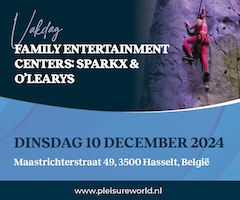The theme of Inclusion: Together towards an inclusive society
How to get there ourselves?

From the start of the preparation of the conference, it was clear that being together and utilising the experiential expertise should become the starting point for the inclusion programme. In order to outline a future, determine strategies, or reshape the design of cities, the public domain and leisure time, the participation of a diverse society was desired from the principle of "universal design". For everyone, by everyone. Not a conference merely talking "about" inclusion, but at its core striving for inclusiveness itself. Shaping an inclusive design process for which everyone would be invited, not focusing on an assumed average or mainstream user, but going right up to the field's edges and corners. In addition to the approach of the entire conference in which we invited a solid mix of lecturers, researchers, students from multiple years and national and international fields of study, as well as representatives from the entire breadth of the leisure industry, we wanted to increase the diversity of participants in the inclusive design sessions through our regular collaboration partners. These partners connect various communities, such as LFB, the national advocacy organisation by and for people with intellectual disabilities, MuZIEum which focuses on the visually impaired community, Best Buddies with youth and refugee couples, and so on. The parties involved in the conference are briefly highlighted in the frame.
Peter Horsten and Simon de Wijs are lecturers and researchers in the domain of Leisure & Events at Breda University of Applied Sciences, editors of Uncover and co-organised the Future of Leisure conference.
Special thanks to feedback group with self-advocates: Mélissa van der Elst, Student Advisor Inclusion at Utrecht University of Applied Sciences. Nya Dijkerman, guide at MuZIEum. Elles Jongerius, director of LFB for and by people with an intellectual disability.
Towards an inclusive society
"We are not there yet. When talking about an inclusive society, bonding and bridging are key elements to achieve this and leisure can play an important part. Over the most recent decades, the Netherlands has become a multicultural and diverse society. Is it also an inclusive one? I do not think so,” stated Rabin Baldewsingh, National Coordinator against Discrimination and Racism at the conference. He provided some examples: "Public space is our living room, where everybody should feel at ease. But that’s not the case. When young people hang out on a bench at the city centre, the municipality will remove the bench because the youngsters are too noisy. Or think about groups with challenges of a disability who must plan everything because it is not easy to get to a city centre. For parking reasons. Is there a toilet? Finally, flying by KLM you will see wooden shoes, tulips, Delft, The Rijksmuseum and canals in the welcoming film. Okay, it is the essence of the country. But why do we not also focus on the diversity by depicting the vibrant Rotterdam Summer Carnaval, attended by a million visitors each year?”

How to create accessible, desirable, and meaningful places where all inhabitants feel welcome and feel like they belong? How should these locations, and especially leisure, be organised? The goal of the design sessions was to re-create society so that everyone can shine, not only as a consumer or an inhabitant, but also as a volunteer, an employee, a researcher, a decision-maker, a designer or a strategist. Leisure plays a significant role in this. Leisure organisations in particular design activities which can build bridges. It is precisely in the leisure domain that places emerge where we can meet, express ourselves and get to know others. Culture and sports create opportunities to "empower”. Theatres, pop venues, restaurants and media provide platforms for everyone to have a voice. Leisure activities offer inspiration, relaxation, connection, meaning, development, or happiness to varying degrees according to different preferences.
Design sessions
Universal design which is usable by all people to the greatest extent possible, without the need for adaptation or specialised design. From that perspective, re-development towards an inclusive society with inclusive places, goes beyond services such as a separate entrance or platform for people with a physical disability. To take a step towards that, an attempt was made to use rules for universal design as a guiding principle such as usability for all, flexibility, simplicity, understandability and appropriate dimensions. And on the other hand, it was built from the start together with a wide diversity of stakeholders, paying attention to equality of input, mutual understanding and commitment. Finally, the idea was to not to start with a grand abstract challenge of creating an inclusive society, but instead of that call for sharing existing personal experiences, obstacles, challenges or dreams around leisure and public space, and invite others to think about redesign these together.
My most memorable moment was the dance workshop hosted by Tiuri. I found it to be very playful, and it was nice to see all these cognition focused colleagues and other people cutting loose and dancing together. (Peter van der Aalst, Manager of the Leisure and Events domain)
Nya, who is visually impaired, mentioned that he would enjoy being able to move freely on the street by himself. "This really hit some people hard as many don't realise that this is usually not possible.” Accessibility is not implemented that well in public spaces. An example is the tactile pavement which is supposed to lead to a place to cross the street. But because it is situated between two bicycle parking structures it is always obstructed by bicycles. Therefore, you can never use the tactile pavement. Indicating white, green or brown glass on a glass bin in Braille is another such example. Awareness needs to be increased in all areas. The solution to many mobility problems lies only partly with me. One can create an app as an aid for visually impaired people, but when motorists do not know that a visually impaired person crossing the street has the right of way, it is still dangerous. Programming people is complicated. During the workshop sessions, various directions for solutions were explored from awareness campaigns to experiments with other floor structures."
In addition, participants looked for inclusive hubs where various activities can be programmed and inclusive food or theatre events for visitors, cooks and performers alike. Other groups focused on more inclusive education. Learning together, playing together as a foundation. Achieve change - together with youth, through education and playgrounds - toward a more inclusive future.
Many appreciated the personal contributions to the meetings and the joint exploration during the workshop sessions. At the same time, it was recognised that certain groups were also under- and overrepresented during the conference.
Fortunately, participants felt heard and welcome. "What an inspiring day it was! The morning was challenging, but also mega interesting and it was possible to keep up. The afternoon was very useful. Nice to see how everyone agreed with each other's ideas and possibilities," said Elles Jongerius, who felt it was very important that a group of people with intellectual disabilities were invited by LFB and theatre workshop Tiuri. "Recognise that it is not always obvious that people with an intellectual disability can participate in leisure activities. How do I book a restaurant? Do I understand how to make a reservation? Is it accessible so that I can get in? Self-advocates themselves need to explain how important it is and what is important to get an inclusive and accessible society in terms of leisure. Great that we were invited to participate in designing the future of leisure.”
Conference accessibility
Another challenge was to include the entire conference organisation in the effort to make the conference accessible to all. What is nice is that accessibility has already been considered as much as possible in the design of the BUas campus. Automatic entrances (though by no means implemented everywhere), adapted restrooms and ramps next to stairs certainly make the campus wheelchair-friendly. "There are clear maps on site, large enough to read when passing in a wheelchair, which allowed me to find my way independently. Except for the gutters for rainwater, there were few bumps. Only the gravel paths near the bicycles turned out to be an obstacle. A simple sign or icon with an arrow on the floor can really help show people that an 'alternative route' is available," Mélissa said.
It is important to include the people who should benefit from the accessibility tools in the planning process. (Nya Dijkerman)
However, when organising an international conference to which various groups are invited, more is needed than wheelchair-friendliness. It proved difficult to get the principles of universal design on the agenda right from the start. Although Marianne Dijkshoorn's (2018) handbook was kept in mind, action on broad accessibility was delayed. Due to the volume of tasks, matters were first settled for the greatest common denominator. A missed opportunity, because designing for everyone and not just for an average visitor naturally ensures that both they and the exceptions are optimally served. Two examples of discourses which illustrate the complexity and sensitivity in such processes. What resources do you offer or need? A tricky topic. "Surely we're not going to invest in accessibility which later turns out to be unnecessary," is an often-heard response, as quoted by Mélissa. Sometimes you can ask in advance. For example, Hogeschool Windesheim asks every student (i.e. not just students with support needs) by mail what help they might need and invites them for a personal interview. But just as often, you do not know in advance. At an information session for prospective students, I actually want to use as many resources as possible to welcome everyone. Also, the idea is that more and more students who at the moment cannot easily access higher education are overcoming their barriers and then know that they should go to you because you are opening up to them."

Similarly, when the conference was organised, there was a long discussion about whether or not to use certain aids, such as a speech-to-text or sign language interpreter. Once aware of its importance (only two weeks before the conference), the image of Irma during corona times seemed to be more decisive in the choice for some than the functional support that a speech-to-text interpreter translating from English to Dutch could provide to both participants with auditory disabilities and participants with intellectual disabilities in the presentations. Of course, the fear of detracting from the overall experience, because the speech-to-text interpreter indicated that he certainly made mistakes or delayed responses from time to time, is secondary to its importance to a minority.
A second example. Brownies and Downies was invited to provide coffee and muffins during the reception. A nice gesture befitting the conference. But on the other hand, the English language proved to be a barrier for the invited speakers and participants with intellectual disabilities. The thought that "this is not the primary audience of the conference anyway" seems innocent. But in addition to serving coffee, thinking about redevelopment of leisure time should of course be accessible. With the use of the text-to-speech interpreter, subtitling in videos, and programming two tracks (Dutch and English) side by side, equal participation of this group became possible.
Feedback and areas for improvement
During and after the conference, we interacted with experiential experts. Overall, the conference experience and accessibility were highly rated. "I am very positive. Many things are super well done, which made me feel very welcome to your beautiful grounds and the conference. Of course, I also saw some areas that could be better, but so much is going well that those little things did not negatively affect my perception," Mélissa said. "In the first building I found signs requesting to only speak English, this would make all people feel welcome. I personally do not share this opinion, I have regularly found myself looking at people gesturing that I have no idea what they were saying. But ehmm okay? When entering at the barrier, when handing out the badges and also during the presentations we were asked to stand up and engage in conversation with the person next to you." Mélissa is both physically and hearing impaired. "I automatically try to see Dutch words in the movement of the speaker's mouth. Just an intercom at the entrance is therefore not convenient. At NS, you usually see at least one counter with a screen. The use of stickers with the language you speak could make it clear that in lip-reading, English is incomprehensible to me. And there are also alternatives for standing up such as raising your hand. Not a big deal, by the way, to stick to these kinds of standards during a conference, but redesign it. Inclusion is not letting go but doing things differently".
Inclusion is not letting go but doing things differently. (Mélissa van der Elst)
And where the others found the colourful corporate identity well thought out, stylish and obvious with the theme colours, translations and distinctive imagery, for Nya it proved to lead to some problems. "Colour contrast is an important aspect. It can be very difficult for me to read signs. For instance, when you have black on red. People with different visual impairments can have different perceptions of colour. Having multiple options would be great. Make things stand out. Even if sometimes at the expense of aesthetics. For the subtitles, for example, there was too little contrast. A black bar may help, it is less attractive, but it does provide more contrast. Adding audio descriptions to videos and pictures can describe what is seen. Also, put the screen a little higher. Especially if you sit a little further in the back, the subtitles at the bottom can no longer be read. And make handouts and maybe floor plans available prior to the conference so I can already study them using my tools." Mélissa adds: "If large-scale events are held in this room more often, it might be an idea to install audio induction loops. The video shown in the morning was incomprehensible without subtitles."
In conclusion
Specialising in Leisure & Events education, the organisers of the conference experienced that universal design is. The first steps have been taken. One rule of universal design has certainly been addressed. Mistakes were made and lessons were learned. Key lesson: involve others to identify and solve the issues. "Good that you asked me beforehand what the solution could be to make it more accessible. Saved some sleepless nights," Mélissa said. "And I was also able to network," Nya adds. "I learned about Buddy to Buddy and became a member in Nijmegen. The other day at the Eid al-Fitr (Sugar Feast) celebration I already attended a first activity".
Recognise that it is not always obvious that people with an intellectual disability can participate in leisure activities. (Ellis Jongerius)
Sources
- Marianne Dijkshoorn (2018). Maak je event toegankelijk voor iedereen. Donald Sudman, BigBusinessPublishers. www.ppbublishers.nl/toegankelijk
Partners involved in the conference’s Inclusion theme
NCDR / HU
As the project leader of the Dutch part of the Inclusive Public Space project of the University of Leeds (UK) and founder and chief editor of the legal journal Handicap & Recht, NCDR senior researcher Dick Houtzager together with Mélissa van der Elst, Inclusion Student Advisor at Utrecht University of Applied Sciences pointed out the next steps’ aims for supporting professionals, students and others in creating an inclusive leisure industry. What became clear is that although the leisure sector has taken significant steps to make events more accessible and inclusive, much still needs be done to ensure that activities can be enjoyed by all, regardless of their ability.
Possibilize
Possibilize connects, thinks and acts in possibilities and is inspired by limitations. This creates sensory-stimulating festivals, immersive live performances and multidisciplinary theatre performances which inspire others. For many people, a disability sounds like an obstacle, an inconvenience, and therefore a problem. Possibilizers show the opposite and are inspired by these limitations in order to arrive at new possibilities that have never been seen before.
Pakhuis de Zwijger
In 2021, Pakhuis de Zwijgers’ extensive Designing Cities for All programme commenced with the support of the Creative Industry Fund NL. This programme focuses on the role of designers in shaping and creating cities for, by and with everyone. At the conference, a set of design principles crucial for designing inclusive cities was presented.
LFB
The LFB Association is an advocacy organisation by and for people with intellectual disabilities.
They work towards a society that is accessible to all. Topics at the conference included the STERK project in education and insights into the exploration between BUas and LFB. Inclusive research and design expecting equal involvement and contributions is the guiding principle. LFB’s experiential experts presented the process and the research results during various workshops.
MuZIEum
The muZIEum is a museum where you experience, for a moment, what it is like to be blind or visually impaired. The Personal Encounter is always at the heart of the experience: a job for some, an experience for others. In pitch-black darkness, visitors trust their expert guide and discover what is possible when you cannot see anything. At the same time, the expert guides develop their talents in a work environment where visual impairment is not an obstacle, but rather an added value. At the conference, participants were able experience this.
Studio Stoofpot
Through workshops, Studio Stoofpot training and consultancy helps motivated organisations that already believe in the importance of inclusivity and accessibility. Their motto? Nothing about us, without us. That is why all their speakers, trainers and consultants combine theoretical knowledge with lived experience. At the conference, participants dived into their personal outlook on the world: what parts of your identity do you think about daily and which parts have you never even been asked to consider? Participants were challenged to broaden their frame of reference and increase their awareness of (intersections of) marginalisation.
Tiuri
‘Theaterwerkplaats’ Tiuri invests in the talent development of performers with a (mental) disability. The performers’ unprecedented talent becomes visible, having a fundamental impact on today’s cultural and social field. By doing so, Tiuri connects the worlds of culture, education and care. In their workshop, Margriet Jacobs and Igor Memic (both Tiuri performers) shared their experience and brought participants into their profession using their movement language.
Football Memories
Reminiscing about football together is the essence of Football Memories. The target group consists of elderly people who struggle with loneliness and/or (early) dementia. Elderly people meet in the stadium where, under the guidance of volunteers, they talk, read and hear about the rich football past of their favourite club. Football as an instrument to create meaningful encounters for older people sharing stories about the old days. At the conference, this method was explained.
Buddy to Buddy
Buddy to Buddy matches newcomers who have a refugee background with fellow citizens. Newcomers are familiarised with their new environment and residents get to know their new neighbours. By getting to know each other and each other’s culture, they not only expand their own world, but also that of others. At the conference, participants could find out that having one good friend can make a difference and how leisure creates impact.
BO Diversity
BO Diversity is a not-for-profit organisation which creates awareness about prejudices, stereotyping and taboos. BO focuses, among other things, on reducing LGBTI+ phobia, racism and gender discrimination. They work from an intersectional perspective, which means that you are aware of the fact that people could deviate from the standard in several areas, and that these could strengthen one another. The most recent project is the Samesame festival where art, music, performance and culture are blended together in an amazing queer inclusive cocktail.
More information
See Inclusive Leisure, Uncover (6), edition 2022 link Uncover 6 English version (adobe.com)


































































